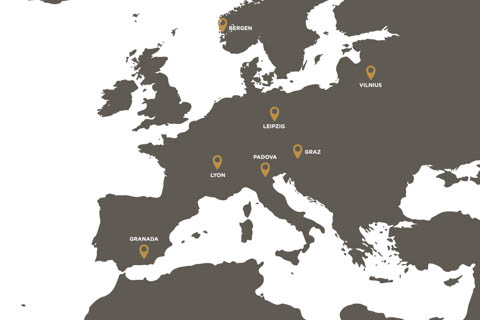Programme structure
Please note that certain changes in programme are possible.
{variantas 18406}
In the first 2 years, basic medical science is taught as a series of courses organised into four concurrent themes: molecular/cellular aspects of medicine; human structure and functions; healthcare in the community; and early clinical and professional development. The integration of science and clinical practice starts at the beginning of the courses. Through a series of lectures, seminars and visits to general practices and hospitals, you will become familiar with patient contact and learn the principles of taking the clinical history and examinations. Student-selected components allow for the study of specific topics in depth. Following this, you will move into the clinical phase, where you will rotate through a series of placements at major teaching trusts throughout the region and community.
*There are three State Graduation Exams for the Medicine study programme: Surgery; Internal Medicine; and Women and Children’s Diseases.
Please note: An internship is integrated into the curriculum of the Medicine study programme and is an obligatory step. However, students are free to choose where to complete the internship – in Lithuania or in other countries. Those who are willing to complete their internships in Lithuania must have at least a B1 level in the Lithuanian language. A B1 level in the Lithuanian language is also required when applying for a licence as a health care professional. The Lithuanian Language course is an optional course in the Medicine/Dentistry study programme, and is available for all who choose it.
Important information regarding the Lithuanian Language course during the study programme:
- VU Faculty of Medicine offers students a Lithuanian Language course FREE OF CHARGE
- A B1 level of Lithuanian language is achieved after four semesters of attendance
- One semester course is 2.5 ECTS credits
- A student shall attend the classes two times per week
Why taking the Lithuanian Language course is important:
- During the clinical courses, it is necessary to communicate with patients. Knowing the language eases communication and considerably helps in the learning process.
- It is easier to obtain licensing in one’s country of choice. After graduating from the integrated Medicine study course, and having a B1 level of the Lithuanian language, graduates may apply for a doctor’s medical practice licence according to the Law on Medical Practice of the Republic of Lithuania. That means graduates can obtain the licences issued in Lithuania. Later on, they could start a practice in Lithuania or in another country where the LT licence is valid, or it might help them to obtain a licence in that country faster and easier. Applying for licences in Lithuania is not mandatory, but it might shorten the procedure and the time required to obtain a licence in another country.










